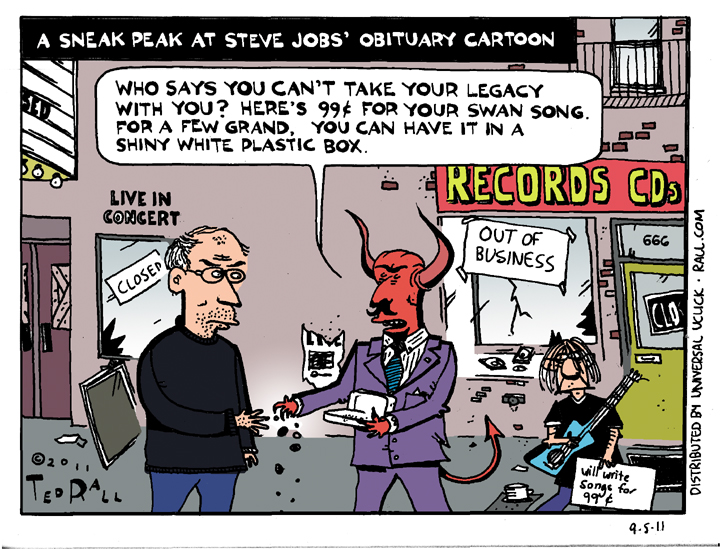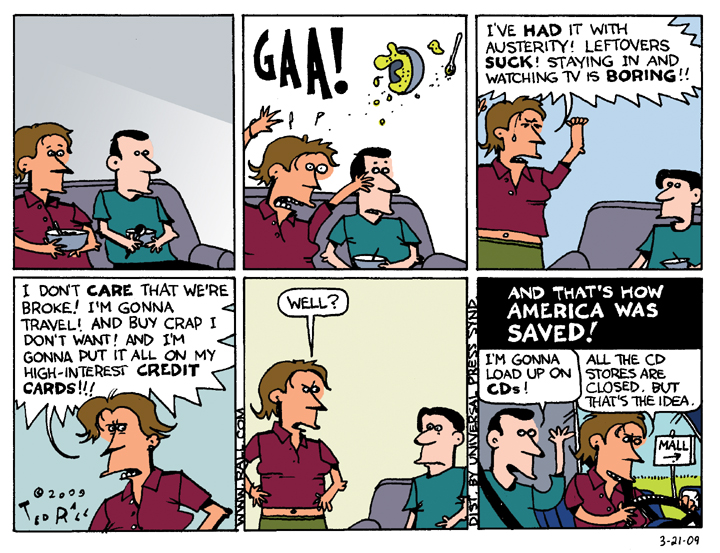Originally published by Breaking Modern:
Compact discs are dead. I realized this recently while shopping for a replacement for my dead 25-year-old Sony CD player; where there used to be lots of brands, now there are only a few and where there were many models, fewer still. Of course, this follows years of watching brick-and-mortar music stores — HMV, Tower, Virgin Megastore et al. — close their doors.
Perhaps it would be more precise to say that CDs were murdered. But was that just? Was that right?
Apple, which both predicts and creates the future, thinks streaming is the future — so they’re driving a stake through the heart of those shiny 5-inch discs whose design was supposedly inspired by an episode of Star Trek.
The computer giant recently ceased production of the signature device it introduced in 2001, the 160GB version of the iPod Classic. Says Will Dunn, editor of Stuff:
The iPod’s days have been numbered since the first iPhone, and the subscription model shows no signs of slowing down. Apple itself is transitioning into music subscriptions with iTunes Radio, and Google has just started trialling YouTube Music Key.”
Still, despite the pressure, many consumers prefer to own rather than rent their music.
Here’s Dunn again: “There’s still a huge affection for the iPod Classic and it’s not hard to see why – Spotify might offer 20 million songs, but 120GB of music is more than most people need, and your iTunes library doesn’t carry data charges or a subscription fee. Also, I think the Classic is a more distraction-free listening experience – I’m more likely to get through a full album on one.”
Music geeks have driven up the price of used iPod Classics on eBay and Amazon by hundreds of dollars more than their original cost.
Apple isn’t alone. Auto manufacturers have signaled that new cars will soon come with MP3 players, not CD players, standard.
2014 was a disastrous year for the music industry, with sales of both compact discs and MP3 downloads way down — to historical lows — as streaming gained steam. “Digital track sales are falling at nearly the same rate as CD sales, as music fans are turning to streaming—on iTunes, SoundCloud, Spotify, Pandora, iHeartRadio, and music blogs,” reports Derek Thompson of The Atlantic.
Before you sell all your CDs on eBay, however, you might want to think twice. Compact discs have a number of distinctive advantages over streaming and digital downloads.
CDs Win on Quality
“Steve Jobs was a digital pioneer, but when he went home, he listened to vinyl,” Neil Young noted in 2012. Audiophiles who know the difference say vinyl offers the richest, most textured listening experience. Though vinyl is decidedly superior to compact disc, the CD is better than MP3 as we know it.
Downloads and streams music is highly compressed in order to keep the data flowing and maximum storage space, but that efficiency comes at a cost. “True CD-quality files take up anywhere from three to 10 times as much as space as an MP3 or AAC file, depending on the latter’s bit rate; 24-bit files take up even more space,” according to PC Magazine.
Owning Beats Renting
Digital data is easy to lose. If you don’t believe me, Google “lost my iTunes music library.” Yes, sometimes it’s possible for the poor souls who somehow managed to erase thousands of dollars of music from their devices to restore them. Other times, not so much. Either way, the one thing you can be sure of is that it won’t be painless.
A friend – she was the first person to show me how cool the iPod was – got rid of all of her CDs after ripping them. Then some jerk broke into her apartment and stole both the player and the laptop to which she synced it. Just like that, she became a music pauper.
True, if she had downloaded all her songs from iTunes she could have gotten them back. To me, however, the bigger lesson is, I trust myself more than I trust some company. She should’ve held on to the CDs.
The Physicality of Music Is Rewarding
A woman from England wrote to NPR’s music blog: “When I was a teenager, I saved up to buy music, bought one CD or record at a time, and listened to the crap out of it. I knew all the lyrics, I knew melodies and bass parts, I had different recordings of the same track — all that. Now, I download a heap of music: some albums, some singles, some random tracks that catch my fancy. I listen to them a few times, and then they get lost in the iTunes pit of despair.”
Downloaded MP3s aren’t songs as much as they are items on a list. Stuff you stream on Spotify or Pandora doesn’t even rise to that level; it’s just something that you hear in passing the middle of a bunch of other stuff. Unless a song really stands out, you’re not going to pay close attention. The odds that a tune will grab you enough to learn the lyrics, much less change your life, are radically diminished by the combination of abundance and randomness inherent to post-compact disc formats.
I recently reorganized my extensive CD collection – aside from being a bit of a music addict, I reviewed records for many years and so have thousands of them – and found myself falling back in love with the physical form of the CD. While the artwork and liner notes in 5-inch booklets pale in comparison with their 12-inch vinyl predecessors, they’re better than nothing – and nothing is what we get when we stream or download. Like it or not, visuals matter.
Albums Force Serendipity
Remember the joy of discovery? On a vinyl album or a compact disc, the listener is “forced” to sit through “lesser” songs that, when they don’t work out so well, are viewed by fans and critics as contract-fulfilling filler. But that’s hardly the case for every band. In the digital age you can always download a single for 99 cents and avoid the dross — but what if the songs that never made it as hit singles for whatever reason turn out to be great? Odds are, you’ll never know. With a CD, you get to experience the full creativity of your favorite musicians as they experiment and stretch free of the constraints that come with trying to score that big hit.
Support Musicians, Not Streamers
Obviously you want the bands and musicians whose work you enjoy to make as much money as possible so that they’ll be motivated to soldier on. Unfortunately, digitalization has hit creative people hard, and musicians are no exception.
It’s pretty clear that, for the average band with a decent sized but not crazy fan base, compact discs are far more lucrative than digital radio and other contemporary formats.
Streaming services like Pandora and Spotify are notoriously parsimonious with artists, and at this point anyone with a conscience really shouldn’t be supporting them.
You Can Sell CDs …
Although the price per song is roughly the same when you compare a 99-cent download to a $14 CD with 13 songs on it, the price differential changes radically when you consider the fact that you can easily sell a used CD. If you have good taste, in fact, you could probably make a pretty good living investing in CDs – I’ve noticed that many of the CDs I bought for $12 way back when are worth $50 or more to collectors.
That’s a better rate than I got on my 401(k).
You could even make a habit of purchasing physical compact discs, ripping them at the highest possible quality to save and sell them. In many cases, you would probably be getting a dozen songs for just a couple of dollars. And then you wouldn’t be stuck with all those discs to store.
Just make sure to keep a backup hidden away in case my friend’s burglar drops by.



